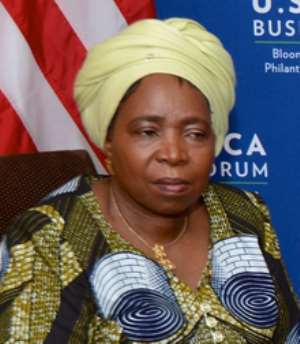
On this week of the Africa Day for Food and Nutrition Security, we decry the fact that Africa still leads the rest of the world as the most seriously affected by hunger and malnutrition. In fact, there are more stunted children in Africa today than there were 20 years ago.However, we also take hope that now we have both a road map for change and the unanimous will from African leaders to bring food security in our lifetime closer to a reality.
By signing the MalaboDeclaration this year,African Heads of State and Governments committed to bold new targets to be achieved by the year 2025. They commit, among others, to eliminate hunger and reduce poverty by half, create job opportunities for Africa's youth and women and improve the resilience of households.
Most importantly, they commit to doing this by investing in theiragricultural sectors.The critical importance of agriculture to eradicate poverty and achieve food and nutrition security is uncontested.Investments in agriculture will ensure much more than feeding two billion Africans by 2050, a crucial goal in its own right. It has been proven to be the continent's solution to long-term social and economic development concerns of youth unemployment, gender inequality and climate change adaptation- major issues facing every African country.
Through the African Union's Comprehensive Africa Agriculture Development Programme (CAADP), we have a process for African leadership to drive agricultural transformation in every country. The deeper we commit to this process, the greater the level of harmonisation and alignment to Africa's agenda for growth and, at the end of the day, prosperity for all Africans.
Africa must be transformed from a continent reliant upon food imports to one that can feed itself and ultimately export a surplus to help feed a growing world population.Currently, Africa spends more than 40 Billion US Dollars a year on food imports. Africa's population is among the fastest growing in the world and so is their demand for food. The African market is now close to one billion people, including over a 100 million middle class consumers. When combined with our abundant agriculturally suitable land yet to be utilized and water resources, we can transform Africa into an agricultural powerhouse.
But this will take substantial and new investments across the entire value chain – from the smallholder farm to agro-processing facilities, and from railways, transport systems and storage to finance, trade and market infrastructure.It means mobilizing investments both public and private into facilities that will stimulate agricultural markets, including energy, storage facilities, transport and lifting of restrictions on the movement of people and goods on the continent.
Intra-African trade is a critical element to ensuring that food will move from surplus to deficit areas and moreover, it will ensure that the poor and vulnerable are able to remain resilient in the face of economic shocks and severe weather events.We need mechanisms in place for food to move easily to the neediest on the continent during hard times. No one country can really claim to be food secure if their neighbour goes hungry.We are all in this together. The renewed commitment in Malabo by African leaders to redouble efforts to boost competitiveness and trade in intra-African markets is a step in the right direction and a non-negotiable element to food and nutrition security across the continent.
Agriculture and Food Security are critical priorities for Africa. If we get this right, it has the potential not only to propel us towards our goal of eradicating poverty and hunger in one generation, but also to contribute towards the industrialization through agro-processing and the development of infrastructure.
The way forward has never been clearer. It is time to put agriculture at the top of our national development agendas by stepping up and spending up to ensure a rapid, steady path to development for all Africans.It is time to do this together. By 2025, on this Africa Day for Food and Nutrition Security, we must be celebrating our victory over hunger and malnutrition. It's in our hands.
* Dr. Nkosazana Dlamini Zuma is the Chairperson of the African Union Commission.
 Dr. Nkosazana Dlamini Zuma
Dr. Nkosazana Dlamini Zuma




 Lay KPMG audit report on SML-GRA contract before Parliament – Isaac Adongo tells...
Lay KPMG audit report on SML-GRA contract before Parliament – Isaac Adongo tells...
 Supervisor remanded for stabbing businessman with broken bottle and screwdriver
Supervisor remanded for stabbing businessman with broken bottle and screwdriver
 NDC watching EC and NPP closely on Returning Officer recruitment — Omane Boamah
NDC watching EC and NPP closely on Returning Officer recruitment — Omane Boamah
 Your decision to contest for president again is pathetic – Annoh-Dompreh blasts ...
Your decision to contest for president again is pathetic – Annoh-Dompreh blasts ...
 Election 2024: Security agencies ready to keep peace and secure the country — IG...
Election 2024: Security agencies ready to keep peace and secure the country — IG...
 People no longer place value in public basic schools; new uniforms, painting wil...
People no longer place value in public basic schools; new uniforms, painting wil...
 'Comedian' Paul Adom Otchere needs help – Sulemana Braimah
'Comedian' Paul Adom Otchere needs help – Sulemana Braimah
 Ejisu by-election: Only 33% of voters can be swayed by inducement — Global InfoA...
Ejisu by-election: Only 33% of voters can be swayed by inducement — Global InfoA...
 Minority will expose the beneficial owners of SML, recover funds paid to company...
Minority will expose the beneficial owners of SML, recover funds paid to company...
 Prof. Opoku-Agyemang has ‘decapitated’ the NPP’s strategies; don’t take them ser...
Prof. Opoku-Agyemang has ‘decapitated’ the NPP’s strategies; don’t take them ser...
